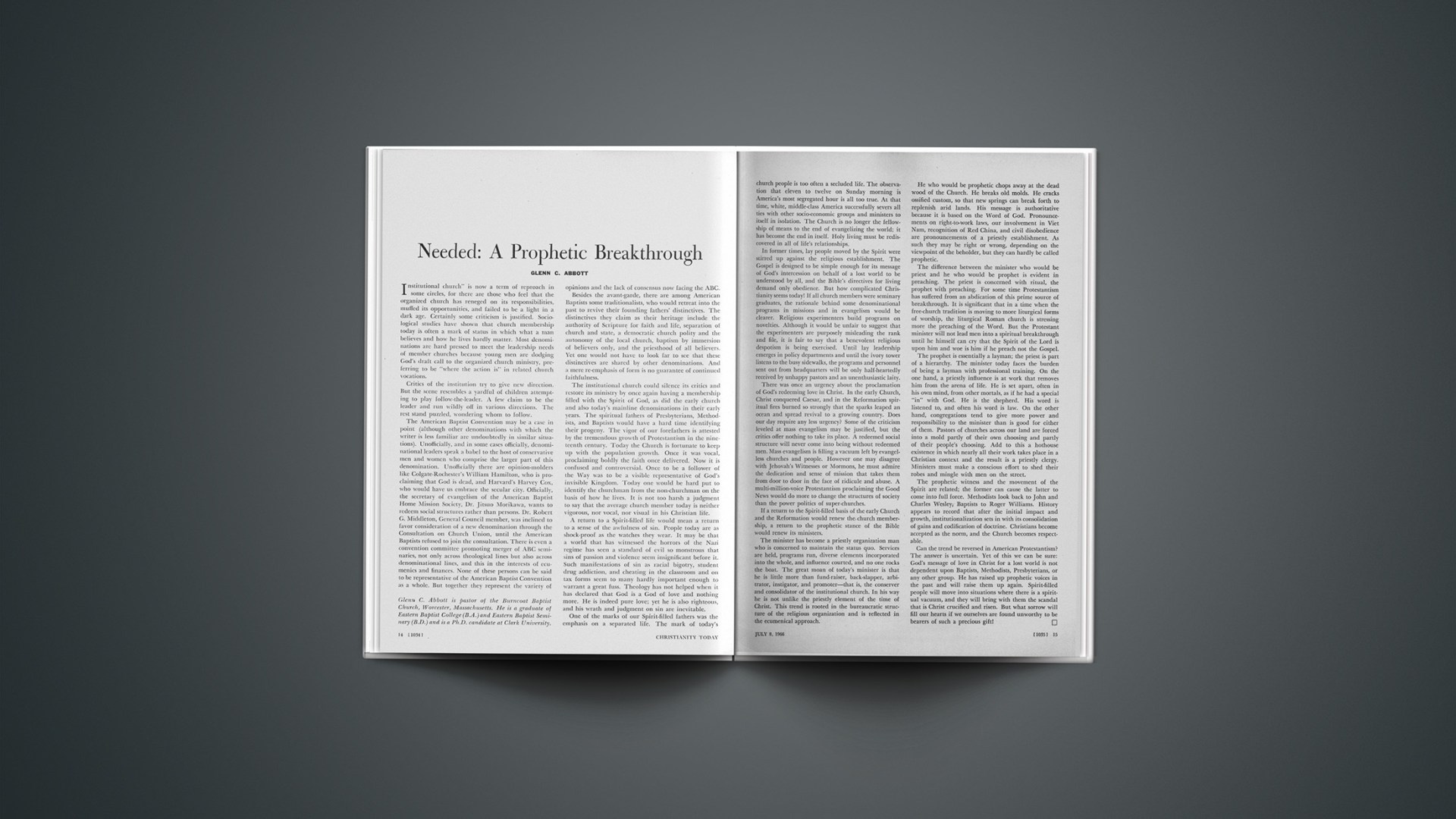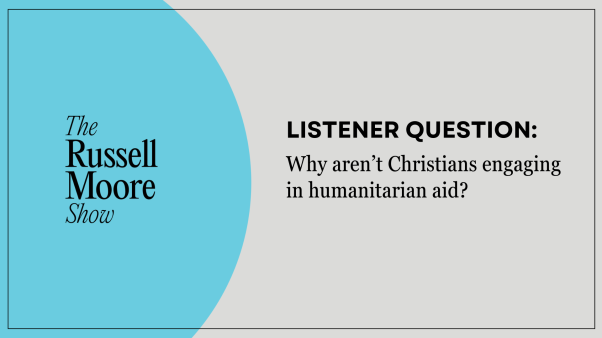Institutional church” is now a term of reproach in some circles, for there are those who feel that the organized church has reneged on its responsibilities, muffed its opportunities, and failed to be a light in a dark age. Certainly some criticism is justified. Sociological studies have shown that church membership today is often a mark of status in which what a man believes and how he lives hardly matter. Most denominations are hard pressed to meet the leadership needs of member churches because young men are dodging God’s draft call to the organized church ministry, preferring to be “where the action is” in related church vocations.
Critics of the institution try to give new direction. But the scene resembles a yardful of children attempting to play follow-the-leader. A few claim to be the leader and run wildly off in various directions. The rest stand puzzled, wondering whom to follow.
The American Baptist Convention may be a case in point (although other denominations with which the writer is less familiar are undoubtedly in similar situations). Unofficially, and in some cases officially, denominational leaders speak a babel to the host of conservative men and women who comprise the larger part of this denomination. Unofficially there are opinion-molders like Colgate-Rochester’s William Hamilton, who is proclaiming that God is dead, and Harvard’s Harvey Cox, who would have us embrace the secular city. Officially, the secretary of evangelism of the American Baptist Home Mission Society, Dr. Jitsuo Morikawa, wants to redeem social structures rather than persons. Dr. Robert G. Middleton, General Council member, was inclined to favor consideration of a new denomination through the Consultation on Church Union, until the American Baptists refused to join the consultation. There is even a convention committee promoting merger of ABC seminaries, not only across theological lines but also across denominational lines, and this in the interests of ecumenics and finances. None of these persons can be said to be representative of the American Baptist Convention as a whole. But together they represent the variety of opinions and the lack of consensus now facing the ABC.
Besides the avant-garde, there are among American Baptists some traditionalists, who would retreat into the past to revive their founding fathers’ distinctives. The distinctives they claim as their heritage include the authority of Scripture for faith and life, separation of church and state, a democratic church polity and the autonomy of the local church, baptism by immersion of believers only, and the priesthood of all believers. Yet one would not have to look far to see that these distinctives are shared by other denominations. And a mere re-emphasis of form is no guarantee of continued faithfulness.
The institutional church could silence its critics and restore its ministry by once again having a membership filled with the Spirit of God, as did the early church and also today’s mainline denominations in their early years. The spiritual fathers of Presbyterians, Methodists, and Baptists would have a hard time identifying their progeny. The vigor of our forefathers is attested by the tremendous growth of Protestantism in the nineteenth century. Today the Church is fortunate to keep up with the population growth. Once it was vocal, proclaiming boldly the faith once delivered. Now it is confused and controversial. Once to be a follower of the Way was to be a visible representative of God’s invisible Kingdom. Today one would be hard put to identify the churchman from the non-churchman on the basis of how he lives. It is not too harsh a judgment to say that the average church member today is neither vigorous, nor vocal, nor visual in his Christian life.
A return to a Spirit-filled life would mean a return to a sense of the awfulness of sin. People today are as shock-proof as the watches they wear. It may be that a world that has witnessed the horrors of the Nazi regime has seen a standard of evil so monstrous that sins of passion and violence seem insignificant before it. Such manifestations of sin as racial bigotry, student drug addiction, and cheating in the classroom and on tax forms seem to many hardly important enough to warrant a great fuss. Theology has not helped when it has declared that God is a God of love and nothing more. He is indeed pure love; yet he is also righteous, and his wrath and judgment on sin are inevitable.
One of the marks of our Spirit-filled fathers was the emphasis on a separated life. The mark of today’s church people is too often a secluded life. The observation that eleven to twelve on Sunday morning is America’s most segregated hour is all too true. At that time, white, middle-class America successfully severs all ties with other socio-economic groups and ministers to itself in isolation. The Church is no longer the fellowship of means to the end of evangelizing the world; it has become the end in itself. Holy living must be rediscovered in all of life’s relationships.
In former times, lay people moved by the Spirit were stirred up against the religious establishment. The Gospel is designed to be simple enough for its message of God’s intercession on behalf of a lost world to be understood by all, and the Bible’s directives for living demand only obedience. But how complicated Christianity seems today! If all church members were seminary graduates, the rationale behind some denominational programs in missions and in evangelism would be clearer. Religious experimenters build programs on novelties. Although it would be unfair to suggest that the experimenters are purposely misleading the rank and file, it is fair to say that a benevolent religious despotism is being exercised. Until lay leadership emerges in policy departments and until the ivory tower listens to the busy sidewalks, the programs and personnel sent out from headquarters will be only half-heartedly received by unhappy pastors and an unenthusiastic laity.
There was once an urgency about the proclamation of God’s redeeming love in Christ. In the early Church, Christ conquered Caesar, and in the Reformation spiritual fires burned so strongly that the sparks leaped an ocean and spread revival to a growing country. Does our day require any less urgency? Some of the criticism leveled at mass evangelism may be justified, but the critics offer nothing to take its place. A redeemed social structure will never come into being without redeemed men. Mass evangelism is filling a vacuum left by evangelless churches and people. However one may disagree with Jehovah’s Witnesses or Mormons, he must admire the dedication and sense of mission that takes them from door to door in the face of ridicule and abuse. A multi-million-voice Protestantism proclaiming the Good News would do more to change the structures of society than the power politics of super-churches.
If a return to the Spirit-filled basis of the early Church and the Reformation would renew the church membership, a return to the prophetic stance of the Bible would renew its ministers.
The minister has become a priestly organization man who is concerned to maintain the status quo. Services are held, programs run, diverse elements incorporated into the whole, and influence courted, and no one rocks the boat. The great moan of today’s minister is that he is little more than fund-raiser, back-slapper, arbitrator, instigator, and promoter—that is, the conserver and consolidator of the institutional church. In his way he is not unlike the priestly element of the time of Christ. This trend is rooted in the bureaucratic structure of the religious organization and is reflected in the ecumenical approach.
He who would be prophetic chops away at the dead wood of the Church. He breaks old molds. He cracks ossified custom, so that new springs can break forth to replenish arid lands. His message is authoritative because it is based on the Word of God. Pronouncements on right-to-work laws, our involvement in Viet Nam, recognition of Red China, and civil disobedience are pronouncements of a priestly establishment. As such they may be right or wrong, depending on the viewpoint of the beholder, but they can hardly be called prophetic.
The difference between the minister who would be priest and he who would be prophet is evident in preaching. The priest is concerned with ritual, the prophet with preaching. For some time Protestantism has suffered from an abdication of this prime source of breakthrough. It is significant that in a time when the free-church tradition is moving to more liturgical forms of worship, the liturgical Roman church is stressing more the preaching of the Word. But the Protestant minister will not lead men into a spiritual breakthrough until he himself can cry that the Spirit of the Lord is upon him and woe is him if he preach not the Gospel.
The prophet is essentially a layman; the priest is part of a hierarchy. The minister today faces the burden of being a layman with professional training. On the one hand, a priestly influence is at work that removes him from the arena of life. He is set apart, often in his own mind, from other mortals, as if he had a special “in” with God. He is the shepherd. His word is listened to, and often his word is law. On the other hand, congregations tend to give more power and responsibility to the minister than is good for either of them. Pastors of churches across our land are forced into a mold partly of their own choosing and partly of their people’s choosing. Add to this a hothouse existence in which nearly all their work takes place in a Christian context and the result is a priestly clergy. Ministers must make a conscious effort to shed their robes and mingle with men on the street.
The prophetic witness and the movement of the Spirit are related; the former can cause the latter to come into full force. Methodists look back to John and Charles Wesley, Baptists to Roger Williams. History appears to record that after the initial impact and growth, institutionalization sets in with its consolidation of gains and codification of doctrine. Christians become accepted as the norm, and the Church becomes respectable.
Can the trend be reversed in American Protestantism? The answer is uncertain. Yet of this we can be sure: God’s message of love in Christ for a lost world is not dependent upon Baptists, Methodists, Presbyterians, or any other group. He has raised up prophetic voices in the past and will raise them up again. Spirit-filled people will move into situations where there is a spiritual vacuum, and they will bring with them the scandal that is Christ crucified and risen. But what sorrow will fill our hearts if we ourselves are found unworthy to be bearers of such a precious gift!










